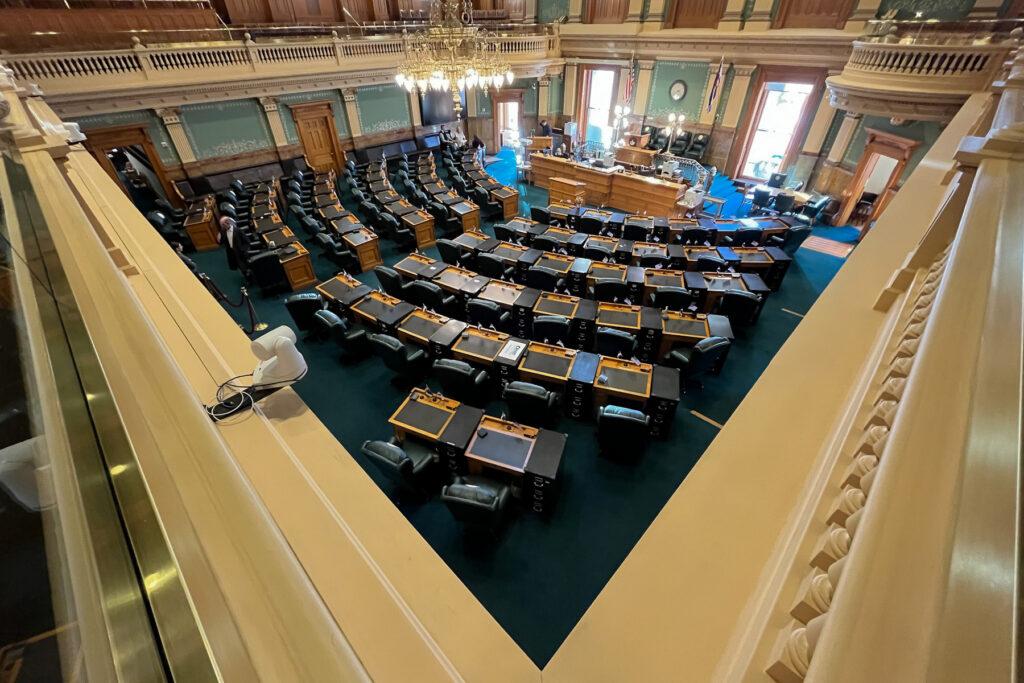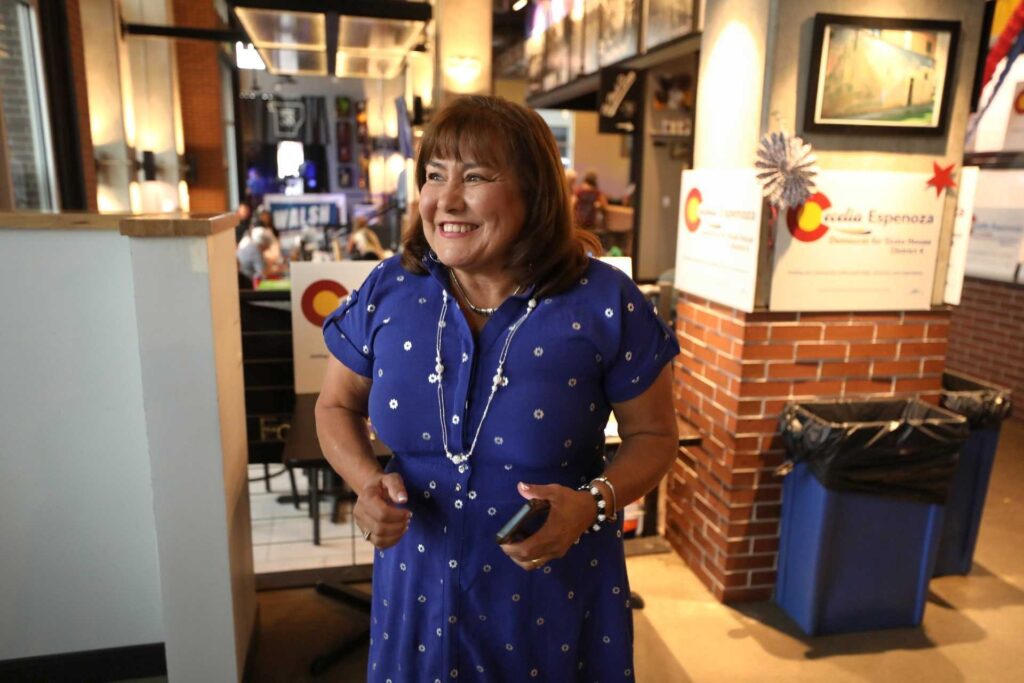
The Denver metro’s representation at the state Capitol is going to look different because of last month’s primaries — and it may signal a change in how the state’s elections are fought.
Three incumbent Democratic representatives lost to challengers in June. Each one represents an area in or near Denver, and all faced well-funded opposition from business and centrist interests.
The heated fight between Democrats showed that primary elections in liberal areas are an intense new focus for the state’s politics, as the party maintains its control of government, said Democratic political consultant Rick Ridder.
“It’s not just that they lost, but that there was such significantly funded opposition. I’ve never seen such highly funded opposition to incumbents,” Ridder said.
The three defeated lawmakers were:
- Rep. Elisabeth Epps, who was elected in 2022 and was seeking reelection to a second term in office. She represents HD6, stretching east from downtown Denver along Colfax Avenue. She was defeated by Sean Camacho.
- Rep. Tim Hernández, who was appointed by a vacancy committee and had just finished his first session in the legislature. He represents HD4, a slice of west and northwest Denver running near Federal Boulevard. He was defeated by Cecelia Espenoza.
- Rep. Julia Marvin, who was appointed to HD31, which is anchored in the city of Thronton. She had just finished her first session. She was defeated by Jacque Phillips.
Camacho, Espenoza and Phillips will now head to the general election, where they are likely to win in these heavily Democratic areas.
Triple the outside spending
Each race had its own unique factors, but heavy outside spending was a common element.
Across the state, independent groups — often with “dark money” funding — spent more than $6 million through the first half of 2024. Most of that money was spent on state legislative races, and the money overwhelmingly focused on Democratic primaries in the state House and Senate. It was roughly triple the spending total from 2020, and a significant increase from 2022.
Ridder said that outside forces are spending more money on these primaries because the party has become so powerful in Colorado that business and other interests see their greatest advantage in influencing which types of Democrats hold sway at the legislature.
Democrats hold more legislative seats than at any time in state history, including a supermajority in the House and a strong majority in the Senate. And there are ever fewer swing seats at play in the general election.
“If you want to make an impact on the ideological mindset of the legislature … it’s imperative that you now play in Democratic primaries,” Ridder said.
Progressives say they’re under attack
The primaries were seen, in part, as a battle between progressive and left-wing Democrats and more business-friendly, centrist candidates.
Deep Badhesha, a progressive political operative, said primary night felt like the “Empire Strikes Back” — with the political establishment dealing a ruthless setback to the rising left flank of the party.
Hernández and Epps were among the most visible members of the party’s left wing, and both were particularly outspoken critics of U.S. support for Israel’s war in Gaza.

Epps said that speaking out about the war catalyzed the opposition to her. That included a day during the special session last year when she joined protesters in the House gallery.
“Since November 2023 I’ve been castigated for objecting to genocide. The reprimand was never about decorum,’ said Epps on social media days before the primary. “From Colorado to Palestine, our liberation is interdependent. You will never get affordable housing from electeds who condone ethnic cleansing.”
Epps faced opposition from many prominent Democrats including House and Senate leaders and Gov. Jared Polis, who took the unusual step of endorsing her opponent. However, she still had Democratic backers in the legislature, including some moderates like Rep. Bob Marshall and Sen. Kevin Priola.
Epps lost to Camacho by more than 20 percentage points. The other incumbents’ races were closer.
Hernández also had been outspoken about the war in Gaza. At 26, he was the youngest member of the general assembly and ran into controversy when he attended a pro-Palestinian protest on the day of the Oct. 7 attack and failed to condemn Hamas. He later apologized.
After the primary, some of his colleagues were surprised by his failure to win over voters.
“I knew it was going to be tough,” said Rep. David Ortiz. “I just thought that he had done enough improvement and work to show himself to be an effective legislator.”
Hernández framed the primary results as part of the bigger fight between reformers and the establishment and pledged to keep up the fight.
“We have no illusions about what we are up against, and it’s far bigger than one opponent in one political race,” he wrote in an email to his constituents. “It’s a system that will spend whatever it has to, do whatever it has to, to maintain a vice grip over the resources that should rightfully be shared for the benefit of all.”
Badhesha said the primary was a call for the party’s left flank to get more serious about campaigning and organizing. “I think everyone's gonna keep their head on a swivel,” he said. “It's going to require a lot more organization.”

Rep. Javier Mabrey, a statehouse ally of the defeated Democrats, doesn’t see the results as a rejection of progressive values — instead arguing that the establishment managed to co-opt the left’s message.
Indeed, one of the outside groups that campaigned against Rep. Marvin was called “Progressives for Accountability & Real Change” while getting all of its funding from the “We Are Colorado Business Coalition,” which is itself funded by groups tied to a mix of business and labor interests. (The group didn’t return a request for comment.)
Marvin and Mabrey both say the defeated incumbents were hurt by low turnout, too. Only 21 percent of active voters in Denver and Adams counties participated in the primaries.
“Voters are disengaged, so I think that’s something that we have to think about for the future,” Marvin said. “How do we get voters engaged for primary elections? Because that’s where a lot of these seats are going to be decided.”

Others aren’t so sure about the “progressives vs. establishment” story.
Ortiz said the primaries don’t mean moderates are beating progressives at the statehouse. He noted some progressives won their races too — like Rep. Mike Weissman, who won a Democratic primary for an open state senate seat despite heavy spending against him.
“So to say that money won, I think is a lazy and incorrect argument. There's some candidates that you could dump all the money you want in there, but they're going to lose,” said Ortiz, who has been critical of Epps.
The winning candidates have also dismissed the idea that they will be more conservative or business-friendly, saying that they can’t control how outside groups spend money.

Badhesha also acknowledged that there was more at play than just political ideology. Hernández and Marvin were both appointed to their seats within the last year, and Marvin in particular had very little time to build up a political organization.
“She didn't have that natural incumbent advantage,” he said, such as building relationships with constituents and colleagues. (Marvin noted that she passed nine bills despite starting late.)
More generally, Mabrey pushed back on the idea of a broader war emerging between progressives and moderates.
“I think we need to be level-headed about what happened,” he said. He planned to wait, he said, and see how things go with his potential new colleagues.
Epps didn’t respond to an interview request for this story. Hernández declined to comment.
Editor's note: This article was updated July 11, 2024 to correct the spelling of Deep Badhesha's name.









